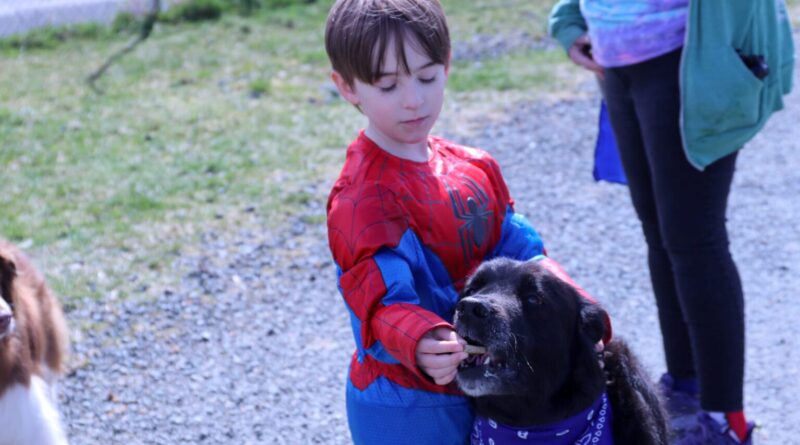Juneau’s child advocacy center holds Superhero Walk amid funding instability
Listen here:
Families, community members and dogs in superhero costumes gathered on the Airport Dike Trail in Juneau on a rare sunny Saturday morning.
The Southeast Alaska Family Evaluation – or SAFE – Child Advocacy Center, Juneau Animal Rescue and AWARE, a nonprofit supporting survivors of domestic and sexual violence, set up tents by the trail, handing out dog treats, bubbles and capes for their first Superhero Walk.
Six-year-old Rex Reid was at the event dressed in a Spiderman and T. rex costume.
“I was supposed to be Spider Rex, but my T. rex mask is kind of lost,“ he said.
The superhero walk is part of the three nonprofits’ effort to raise awareness on different types of abuse. It’s a lighthearted event that celebrates how anyone can be a superhero when it comes to preventing child and animal abuse. Reid said he lost his dinosaur mask, but he was still having a great time hanging out with the animals.
“I’ve been able to pet the dog,” Reid said. “I also gave some treats.”
The effort comes as state funding for child advocacy centers, or CACs, is on the chopping block while the Alaska Legislature considers how to resolve a nearly $2 billion deficit in the budget.
Jenny Weisshaupt is the program manager for the SAFE Child Advocacy Center in Juneau. It’s one of 19 developing or established CACs in Alaska. She said state funding for CACs used to come from a federal source that’s not available next year. For the past decade, the state used federal Temporary Assistance for Needy Families money to fund CACs, but an audit last year put a temporary end to that. A federal grant to expand rural services ends this year too.
Now the Legislature has to decide whether to add their funding to the state budget.
“We were told that everything this year is going to be decided at the very end of session in a conference committee, and then up to the governor to decide what will be funded,” Weisshaupt said.
She said the changes mean Alaska’s CACs will be down $5.5 million if the state doesn’t fill the gap. So far this legislative session, lawmakers have added that money and taken it out of the proposed budget for the next fiscal year. It’s currently not in the latest draft budget.
On top of that, the amount they receive in federal funding from the Victims of Crime Act is up in the air.
“It’s constantly, for years at the federal level, a question of whether that funding is stable for states,” Weisshaupt said.
She said the Juneau center has a small $75,000 grant meant to increase training and outreach across Southeast Alaska that can be put toward operations if state funding falls through. But it’s not enough to keep the center running as is.
She said that’s critical to the safety of one of the state’s more vulnerable populations. Data from the Annie E. Casey Foundation shows Alaska has one of the highest rates of reported child abuse and neglect in the country and consistently outpaces the national average.
If child abuse happens, or is suspected, the centers do everything from medical exams and mental health counseling to advocating for children through the life of a case. Staff work on a multidisciplinary team with members from the Office of Children’s Services, law enforcement, medical professionals, lawyers and more.
A major role of CACs is to do forensic interviews to confirm if a child has been abused. But not just anyone can do forensic interviews. Weisshaupt said the skill requires years of training that others may not have the time to dedicate.
Matt Dubois is the investigations commander for the Juneau Police Department and sees their value. He said it would be “devastating” for police without the work CACs do.
“The absence of CAC means children might have to endure multiple interviews with different agencies, which is not only emotionally distressing, but can also undermine the integrity of the evidence in these investigations,” he said.
Assistant District Attorney Jennifer Chaudhary said the forensic interviews CACs provide are important when it comes to prosecuting people while avoiding traumatizing children.
“With the CACs, that’s a good way to get that evidence, to get that video testimony to be able to play in court, so that child victims don’t have to come in and re-go over every single thing that they’ve had to talk about already before and go through all of that trauma again,” Chaudhary said.
She said CACs are a neutral space where interviewers can talk to children in a safe space away from other influences, like family members or law enforcement officers. She said adults around children may intimidate them.
Despite the uncertainties, Weisshaupt said she is hopeful the state will fund CACs.
“I know what the government’s thinking and considering right now, but this is a cost that I just don’t see them not funding,” she said. “So I have confidence that someone’s going to figure out how to fund child advocacy centers in some way.”
The legislative session ends May 21, when lawmakers must pass a balanced budget or face a state government shutdown.

